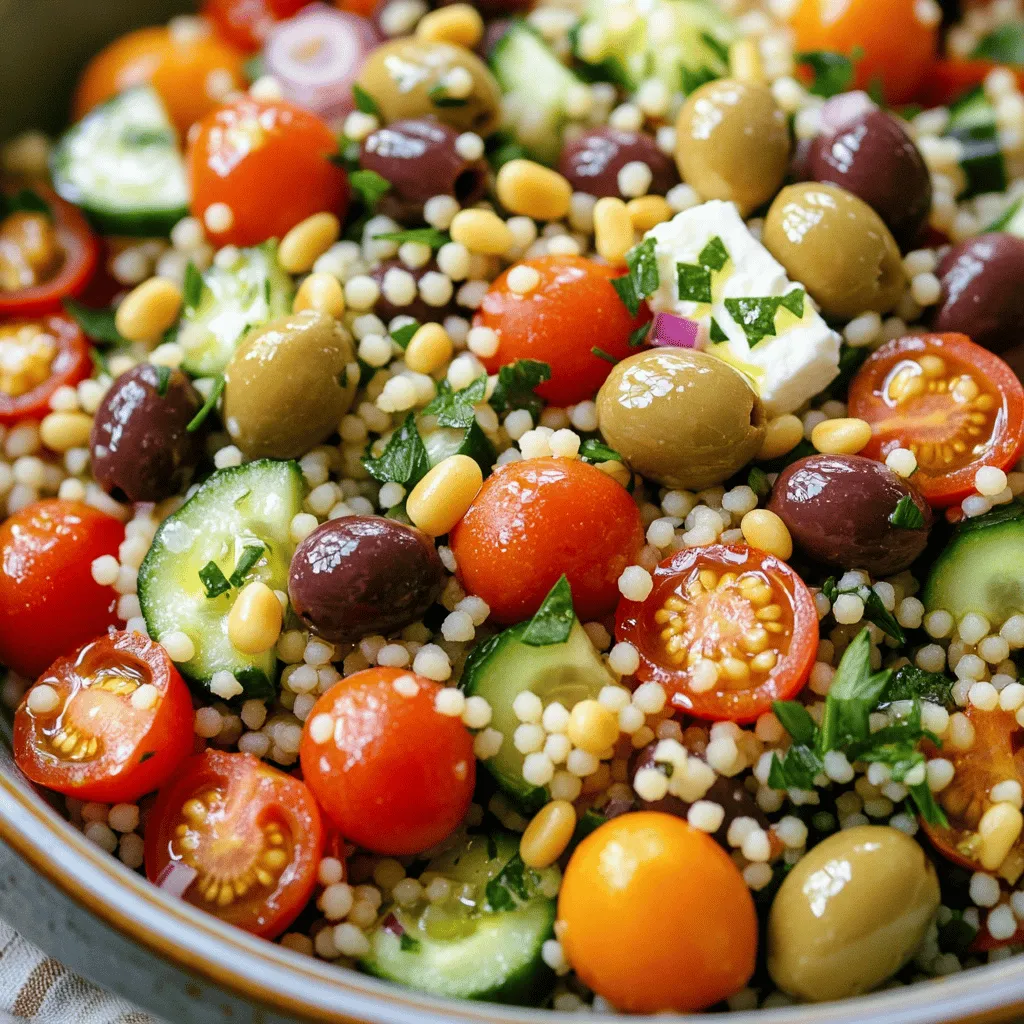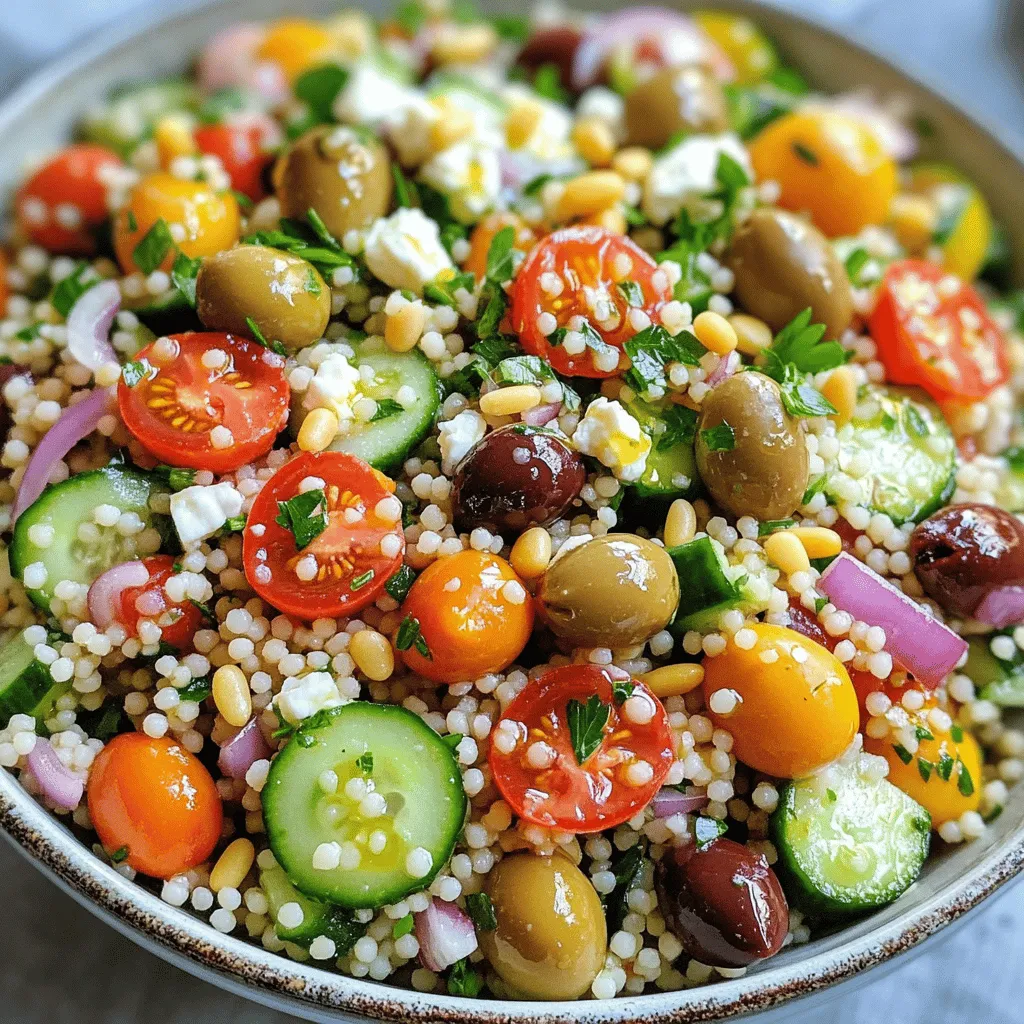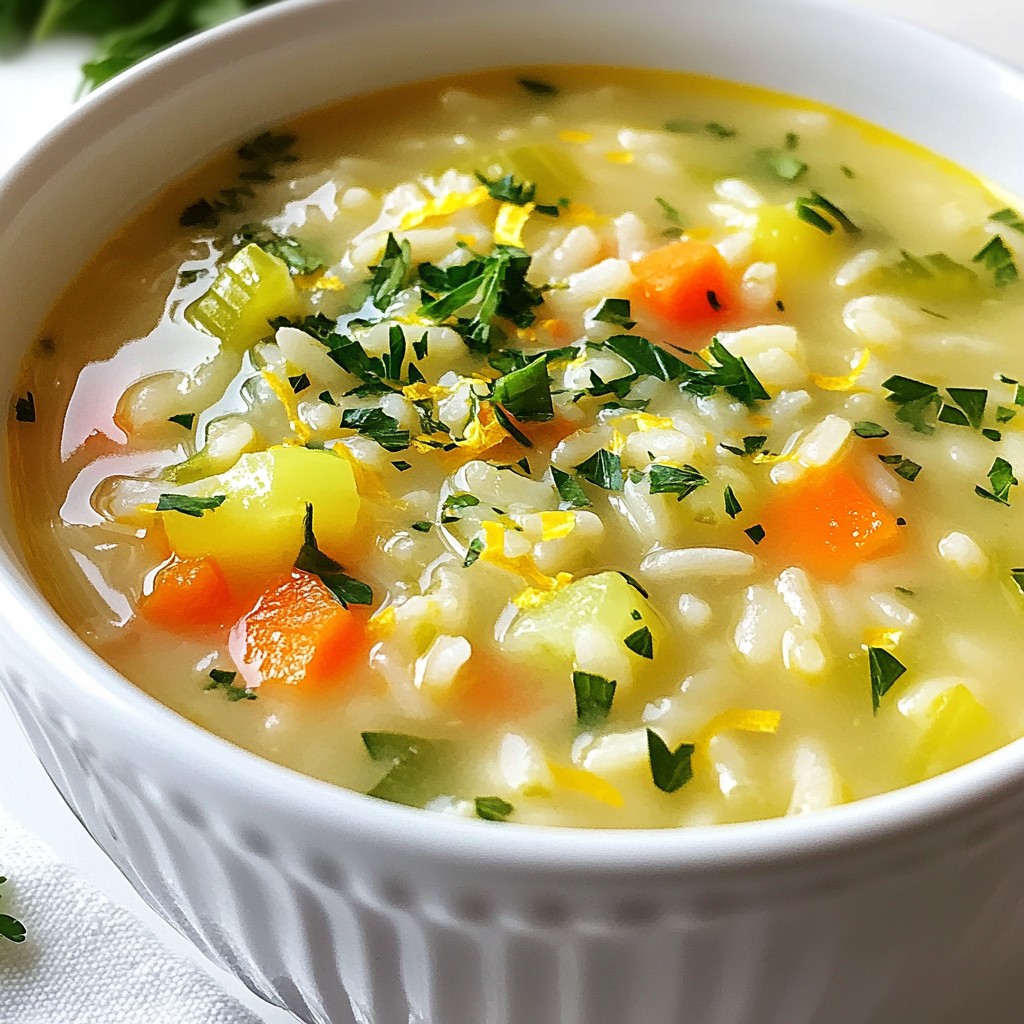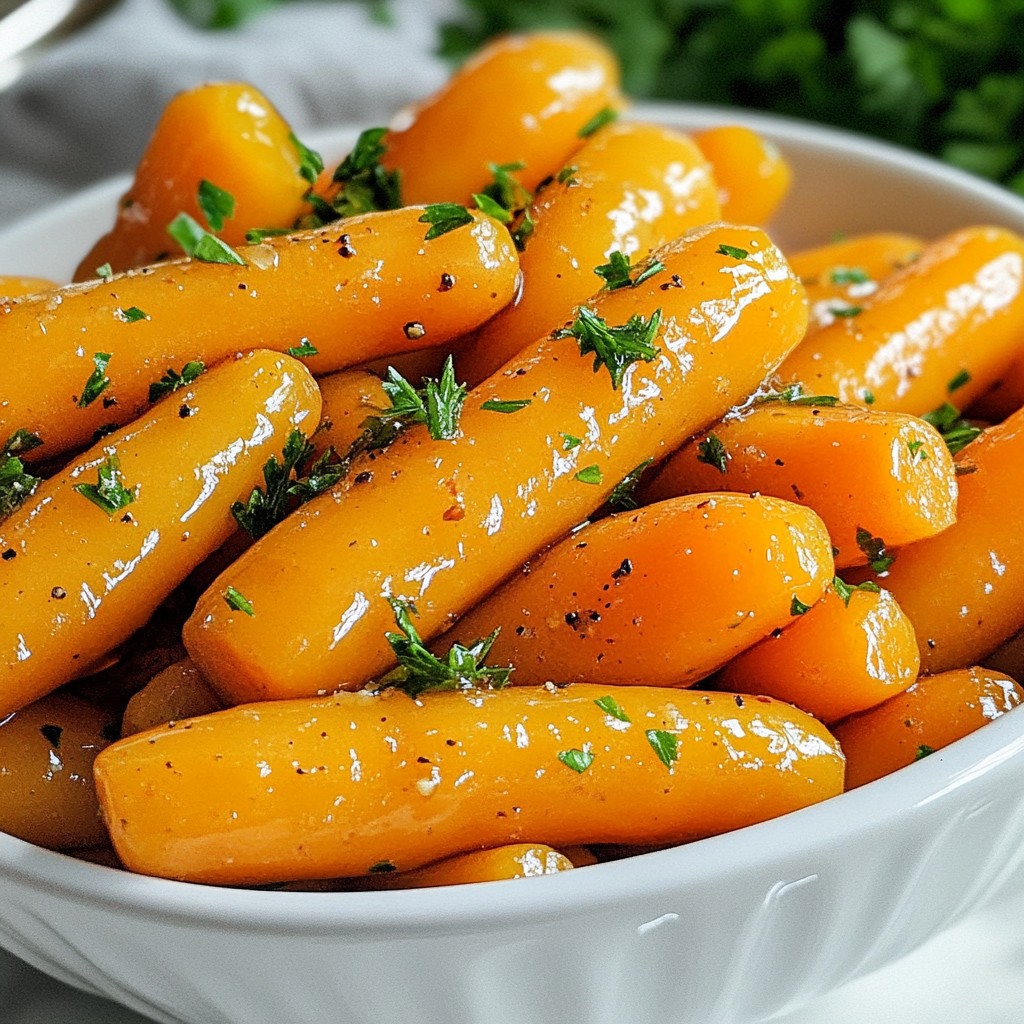Looking for a fresh, flavorful dish that impresses without the fuss? Mediterranean Couscous Salad is your answer. Bursting with vibrant veggies, creamy feta, and zesty dressing, this salad is perfect for any meal. Whether you’re cooking for a crowd or meal-prepping for the week ahead, you’ll find simple steps and tips here. Join me as we dive into this tasty, nutrient-packed salad that will brighten your plate and elevate your palate.
Ingredients
To make a delicious Mediterranean Couscous Salad, you need fresh and vibrant ingredients. Here’s what you’ll need:
– 1 cup whole wheat couscous
– 1 1/4 cups vegetable broth (or water)
– 1 cup cherry tomatoes, halved
– 1 cucumber, diced
– 1/2 red onion, finely chopped
– 1/2 cup Kalamata olives, pitted and sliced
– 1/2 cup feta cheese, crumbled
– 1/4 cup fresh parsley, chopped
– 1/4 cup extra virgin olive oil
– 2 tablespoons lemon juice
– 1 teaspoon dried oregano
– Salt and pepper to taste
Each ingredient adds its own unique flavor. Whole wheat couscous gives a nutty taste and a nice chewy texture. The cherry tomatoes bring sweetness, while cucumbers add crunch. Red onion adds a bit of sharpness, and Kalamata olives offer a briny bite. Feta cheese gives a salty, creamy touch. Fresh parsley brightens the dish. Olive oil and lemon juice create a zesty dressing that ties everything together.
Feel free to explore variations, but this list provides a solid base.
Step-by-Step Instructions
To make a Mediterranean Couscous Salad, follow these simple steps. Each step helps build fresh flavor and texture.
1. Boil the vegetable broth
In a medium saucepan, bring 1 1/4 cups vegetable broth to a boil. This broth adds great flavor to the couscous.
2. Stir in the couscous
Once the broth boils, remove it from the heat. Stir in 1 cup of whole wheat couscous. Cover the pot and let it sit for 5 to 7 minutes.
3. Fluff and cool the couscous
After the couscous absorbs the liquid, fluff it with a fork. Let it cool to room temperature. This step ensures the couscous stays light.
4. Combine vegetables and herbs
In a large bowl, mix 1 cup halved cherry tomatoes, 1 diced cucumber, 1/2 finely chopped red onion, 1/2 cup sliced Kalamata olives, 1/2 cup crumbled feta cheese, and 1/4 cup chopped fresh parsley. This mixture brings vibrant colors and flavors.
5. Mix couscous with vegetable mixture
Add the cooled couscous to the vegetable mix. Stir gently to combine everything. This allows the flavors to blend well.
6. Prepare and add the dressing
In a small bowl, whisk together 1/4 cup extra virgin olive oil, 2 tablespoons lemon juice, 1 teaspoon dried oregano, and salt and pepper to taste. This dressing brightens the salad.
7. Toss and adjust seasoning
Pour the dressing over the salad. Toss everything to coat well. Taste and adjust the seasoning if needed. You want every bite to burst with flavor.Enjoy making this healthy and delicious dish!
Tips & Tricks
Best Practices for Preparation
– How to cook couscous perfectly
To cook couscous just right, use one part couscous to 1.25 parts broth. Bring the broth to a boil, then stir in the couscous. Remove from heat and cover for 5-7 minutes. This lets the couscous soak up all the flavor.
– Tips for chopping vegetables evenly
Use a sharp knife for smooth cuts. Cut the cucumber and tomatoes into similar sizes. This way, every bite has a mix of flavors and textures. Remember, even pieces cook and blend better.
– Achieving the right texture in salad
Fluff the couscous with a fork once it cools. This keeps it light and airy. Mix it gently with the veggies to keep everything intact. Avoid squishing the ingredients, which can make the salad mushy.
Presentation Tips
– Suggestions for serving presentation
Serve your salad in a large, shallow bowl. This shows off the colorful veggies. For a more rustic look, use a wooden or ceramic bowl.
– Garnishing ideas for a pop of color
Add fresh parsley on top for a bright touch. A few whole olives can also add charm. For extra crunch, sprinkle toasted pine nuts or sunflower seeds just before serving. These small details make your dish stand out and look inviting.

Variations
Ingredient Substitutions
When making Mediterranean couscous salad, you can easily swap ingredients to match your taste. Here are some ideas:
– Alternative grains for couscous: Try quinoa or farro for a new texture. Both grains offer a nutty flavor. You can also use bulgur wheat for a similar taste.
– Different herbs and their flavor profiles: Basil and mint can add a fresh twist. Dill works well for a hint of brightness. Each herb changes the salad’s flavor, so mix and match!
– Options for adding protein: You can toss in grilled chicken or shrimp for a hearty meal. Chickpeas or black beans are great plant-based proteins that add fiber and taste.
Seasonal Variations
The ingredients can change with the seasons, making this salad fun all year!
– Spring and summer ingredients: In warmer months, add fresh peas, asparagus, or bell peppers. These veggies add crunch and color. You can also use fresh corn for sweetness.
– Fall adjustments for cooler months: When it’s chilly, roasted butternut squash or sweet potatoes add warmth. You can also try adding cranberries for a sweet touch and a pop of color.
Storage Info
How to Store Leftovers
To keep your Mediterranean couscous salad fresh, follow these tips:
– Refrigeration guidelines: Place the salad in an airtight container. It should stay safe for up to three days in the fridge. Make sure to check the temperature. Your fridge should be set to 40°F or lower.
– Freezing couscous salad tips: Freezing is not the best option for this salad. The vegetables and feta can lose their texture. If you do freeze it, use a freezer-safe container. It can last up to a month in the freezer, but be ready for changes in taste and texture.
Shelf Life
You want your salad to taste great. Here’s what to know about its shelf life:
– Duration for optimal freshness: The salad is best within three days of making it. After that, the flavors may fade, and the texture can change.
– Signs of spoilage: Look for any off smells or a slimy texture. If the vegetables start to wilt, it’s time to toss it. Always trust your senses when checking for freshness.
FAQs
Common Questions
Can I make Mediterranean Couscous Salad ahead of time?
Yes, you can make this salad a day early. It tastes even better after resting. Just keep it in the fridge in an airtight container.
What dressing complements this salad best?
A simple mix of olive oil and lemon juice works great. It adds brightness and enhances the flavors. You can also try a yogurt-based dressing for creaminess.
Is couscous gluten-free?
No, traditional couscous is made from wheat. If you need a gluten-free option, try quinoa or rice.
How do I enhance flavors in the salad?
You can add fresh herbs like mint or basil for a twist. A sprinkle of roasted nuts adds crunch and a nutty flavor too.
Additional User Queries
Can I include additional vegetables?
Absolutely! Bell peppers, zucchini, or even roasted eggplant make great additions. Feel free to experiment with your favorites.
What can I serve with Mediterranean Couscous Salad?
This salad pairs well with grilled chicken or fish. It also complements roasted vegetables or a light soup.
This blog post covered a tasty Mediterranean Couscous Salad. We talked about the key ingredients, including whole wheat couscous, fresh veggies, and feta cheese. I provided step-by-step instructions to create your salad. Tips for perfect preparation and good presentation made the process easier. You also learned about variations and storage advice.
This salad is a healthy, fun dish that you can adapt. Enjoy trying new flavors and serving it fresh!




